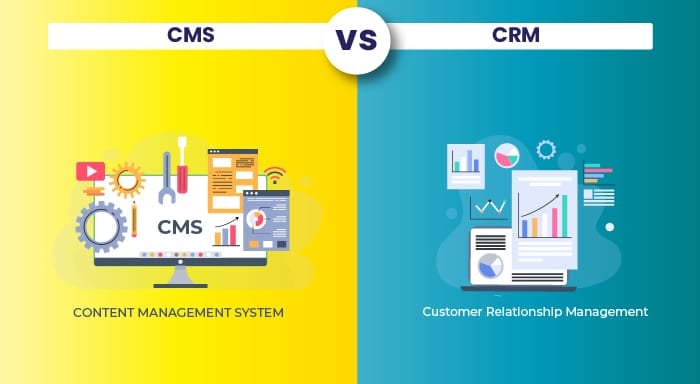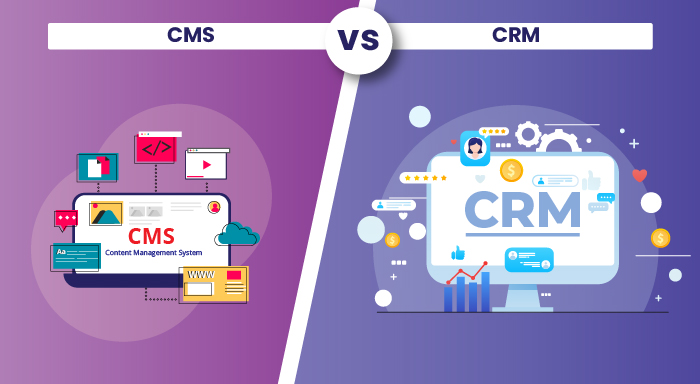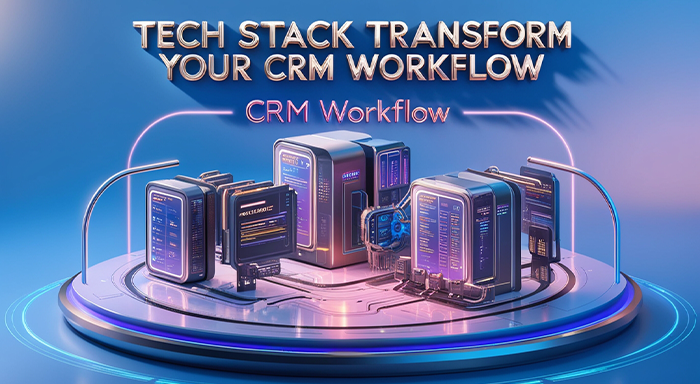CMS stands for Content Management System which is used for content management and CRM stands for Customer Relationship Management which is used to enhance a business relationship with its customers and clients and automate many everyday repetitive monotonous tasks. In this article let's understand CMS vs CRM in depth.
CMS (Content Management System)
This is a software application made for managing and fostering the content management system. There is a centralized system for managing the content, where you can create, edit, manage, and publish your content. The content can be of various types such as content, such as web pages, articles, images, and multimedia elements. WordPress, Magento, and Joomla are some of the CMS applications. Content management is very crucial for a business as it is the first phase of a customer life cycle as well as marketing. As people first go through the content of a brand before deciding to purchase it. Some CRM systems offer open-source coding, while others offer paid subscriptions. Umbraco development services provide businesses with a robust open-source CMS platform, ideal for those looking to customize and manage their digital content more efficiently.
Use Cases of CMS platforms-
- Brands website content- CMS systems create and maintain the website content and you can also upgrade it from time to time.
- Blogs- CMS systems have many specialized features for blogging. It can manage the entire process of publishing blogs and the engagement of the audience on that particular blog.
- E-commerce and online stores- CMS systems are capable of creating and managing online stores, product catalogs, transaction processes, and tracking of delivery.
Features of CMS
- Content creation and modification- CMS platforms have a user interface for creating and editing content like video, blogs etc.
- Content publishing- CMS platforms have tools for publishing particular content on a website or any other software platform. It also manages the various versions of content and the schedule of publishing.
- Content management- Various types of content like documents, images, and videos can be managed and modified using CMS systems.
- User access- CMS systems manage the access of content to the users.
- SEO management- Through CMS systems you can make your content SEO optimized.
CRM (Customer Relationship Management)
CRM is a platform designed to foster a business’s relationship with its customers and clients. By using CRM platforms you can nurture your customers and leads and cater to their requirements in the best way possible. Plus it automates many everyday repetitive monotonous tasks. CRM training courses will help you make the most of these platforms, ensuring that you understand how to leverage their full potential. It also automates many sales, marketing, and customer service tasks. It has tools to store customer data and analyze them, interact with customers and record, track customer activities, etc. All these features and functionalities lead to increased customer satisfaction.
Use Cases of CRM Software
- Sales Automation: CRM systems automate many sales processes like lead generation and tracking, sales forecasting, management of sales pipeline and closure of deals, etc.
- Marketing Automation: CRM systems automate many marketing processes like tracking target audiences, segmenting customers, running marketing campaigns, and customer engagement.
- Customer Service Automation: CRM systems automate many customer service processes like personalized assistance, tracking customer issues, chatbots, etc.
- Brand Awareness: In the comparison of CRM vs CMS, CMS will assist you in promoting your brand awareness whereas you can use it for creating and customizing the template’s content and more.
Features of CRM
- Contact Management: CRM systems fetch and gather customer and lead contact details, store their interaction, and track their activities. Tools like LinkedIn CRM import can further enhance contact acquisition by importing professional profiles directly into your CRM for streamlined outreach.
- Sales Management: Automating sales processes and managing the customer sales cycle.
- Marketing Management: Automating marketing processes and managing them.
- Analytics: CRM systems generate reports and analytics on customer interactions, sales performance, and marketing campaigns.
- Collaboration: The team members can collaborate and work together on any task. The centralized data is accessible to all team members and the admins can track and check the progress of the team members.
- Integration: CRM systems can integrate with other software applications and tools to deliver phenomenal performance.
- Bulk Automation: Along with automating the manual departments using CRM and CMS, you can automate the bulk departmental performance altogether just by using the collaborative CRM
Differences between CRM and CMS

| CRM | CMS | |
| Functionality | Sales, marketing, and customer service management | It is used for content management and knowledge base. For example, blogs and articles website. |
| Users | Mainly sales, marketing, and customer service teams. | Mainly Content teams |
| Report Generation | It stores the information and even analyzes them. It has many AI-integrated tools for advanced analytics. | May provide customers information but cannot analyze it |
| Audience Segmentation | Leads are first categorized on the basis of their geography, demography, interest, business value, etc, and then segmented accordingly. | By collecting and storing data about website visitors, a CMS can help businesses identify different segments of their audience. |
| Documentation | Sharing of notes, documents, and reports can be done. | Component Content Management System (CCMS) can be used for documentation. There are other tools like Adobe Framemaker, Robohelp, etc. |
CRM and CMS Integration
By integrating customer relationship management (CRM) and content management systems (CMS), you can utilize the features of a centralized database. CRM and CMS integration will automate many of your processes to function seamlessly in the organization. Plus, businesses can provide the advantage of the best content management along with the best customer-experience services.
CRM vs CMS is the universal point about which many people want to know with the intention of for which one they need to go to. However, if you will utilize the integration of both all together instead of comparing them against each other, you can provide a far better experience to your customer and upsurge your business rapidly.
Steps for integrating CRM and CMS platforms
- Integration Points and Data- You have to first identify the integration points between the CRM and CMS platforms. Then you have to specify what data has to be shared between both platforms. The data can be sales, marketing campaigns, customer, content data, etc.
- Integration Method- Then you have to choose the most appropriate integration method for you. Some methods for integration are custom integrations, APIs, webhooks, middleware, etc. Choose the method according to your requirements, preferences, and budget.
- Planning- Then you have to plan your integration process. You have to determine the resources required, set timelines, assign team members and their roles, etc. You also have to look at the potential risks and challenges that may arise during the integration.
- Testing- Before launching your final integration you must test it before. You should first check the data accuracy and flow, system performance, etc. Also, you have to check whether your system can handle unexpected errors and bulk data or not.
- Launching and maintaining- After testing you can launch your integrated system. You have to regularly check and monitor the performance of your integrated system and do any updates if required. You can also collect the feedback of your employees regarding the integrated system and improve it accordingly or remove any flaws required to be removed.
FAQs (Frequently Asked Questions)
- What are the relations between CRM and CMS?
CRM (Customer Relationship Management) and (Content Management System) CMS are complementary tools in business operations. Whereas, CRM focuses on managing customer interactions and their data, while CMS handles content creation as well as it’s publication. The Integration of both applications streamlines customer engagement by providing personalized content based on CRM insights that enhance overall customer experience.
- CRM vs CMS: A concise difference between both?
In comparison between CRM vs CMS, you can not choose any one alone. This is because, within a business point, both applications are essential. Since, CRM Customer Relationship Management systems target customer interaction management to facilitate sales data, marketing, and customer service efforts. In contrast, Content Management Systems primarily handles content creation, it’s publishment, and website management.
- Do I need to use a CRM or CMS for my site?
The goal of your website decides for which one you need to go, a CRM or a CMS. If you prioritize managing customer relationships, tracking interactions, and optimizing sales and marketing efforts then CRM software is essential for your site. Conversely, if content creation, publishing, and website management are your main focus then you must go for a CMS software.
- What are some popular CMS options?
Generally, you may find multiple CMS options on the web but here we are mentioning the top 5 Content Management Systems that are go-to-choice options. So, the names of the best 5 CMS options include Oddo, WordPress, Wix, Square Space, and Blogger. Oddo is a software application to that you can use for both purposes whether it is for CMS & CRM.
- What are some popular CRM options?
Same as the CMS, CRM also carries a large number of software applications available on the web. From this, we’ve analyzed and considered the top 5 software applications including Oddo, SuiteCRM, HubSpot, Salesforce, and SugarCRM.
Conclusion
Content management and customer relationship management are the most crucial aspects of an organization. Therefore it's very essential for organizations to understand the importance of both platforms, their benefits, the functionalities offered by them, and the differences between the both. They should also learn how significant their integration is and how this integration can benefit them in delivering the best customer experience.
Author’s BIO

With 15 years of experience in CRM, I specialize in developing plugins for SuiteCRM and SugarCRM. My notable creations include SuiteCRM Email to Lead, SuiteCRM BCC Archiver, and SugarCRM Mailchimp. My expertise lies in enhancing CRM functionalities to drive business efficiency and growth.
Additionally, I create content on YouTube, sharing insights and tutorials on CRM solutions to help businesses enhance their efficiency and growth.








